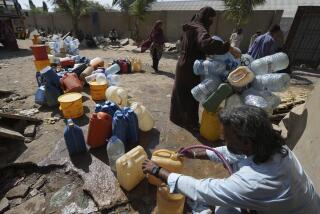U.N. Says Essential Drugs Not Sufficient
- Share via
GENEVA — Life-saving medicines are not available to one-third of the world’s population despite a long international campaign for wider access to essential drugs, the World Health Organization said Monday.
In the 25 years since WHO drew up its essential drugs and medicines list, the number of people able to obtain those medicines has doubled, but there remains “a huge unfinished agenda,” said Jonathan Quick, the head of the U.N. agency’s project.
“We still have 2 billion people who can’t regularly get medicines when they need them, at a quality they trust and at a price they or their community can afford,” Quick told health experts at a discussion attended by journalists.
The U.N. health agency’s list includes more than 300 medicines and aims to guide mainly Third World governments and health bodies on what drugs should be available, at what quality and price and in what dosage.
In poor countries, where a daily income of $1 or $2 is the norm, the burden of financing health care often falls on those who are sick.
WHO Director General Gro Harlem Brundtland said so-called out-of-pocket payments by patients account for as much as 90% of total health care spending in some poor countries.
“For many, the reality is stark: No cash, no cure,” she said.
Bernard Pecoul of Doctors Without Borders said patents, particularly on AIDS treatments, translate into high prices, “with the direct result that people in developing countries cannot afford to save their own lives.”
“We cannot accept the sick logic that says he who cannot pay, dies,” he said.
More to Read
Sign up for Essential California
The most important California stories and recommendations in your inbox every morning.
You may occasionally receive promotional content from the Los Angeles Times.










